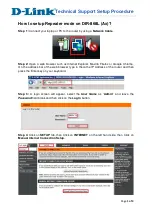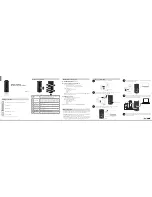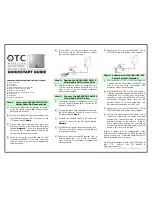
Chengdu Ebyte Electronic Technology Co,;Ltd
E70-433T14S user manual
Copyright ©2012–2019
,
Chengdu Ebyte Electronic Technology Co,;Ltd
13
6.3 Continuous Mode (Mode 1)
Status
M0=1 M1=0 M2=0
Transmitting
Wireless data transmission is available.
Receiving
Wireless data receiving is available.
Baud rate &
air data rate
Module will calculate the minimum air data rate according to the configured baud rate. Since the modules with
different air data rate cannot communicate, the serial port parameters must be the same on both receiver and
transmitter.
Advantage
The data output on the receiver is continuous, it meets the requirements for MODBUS continuous transmission
and low latency.
Disadvantage
The baud rates on both receiver and transmitter must be same. The module will raise its air data when the baud
rate is raised, thus the receiving sensitivity will be lowered and operation range will be shorter.
Applications
Applicable for those applications not requiring distance but continuous data and response time.
Note
1. The “wireless air data rate” in the configuration commands is invalid (SPED.210 bits) and software will
calculate automatically.
2. 0000 and FFFF are the broadcast addresses, which can be used to monitor and broadcast.
3. The addresses and baud rates must be same on both receiver and transmitter.
4. In continuous mode, both transmitter and receiver must be same model. For example, E70 (868T14S) and E70
(868T30S) cannot communicate in continuous mode.
6.4 Sub-package Mode (Mode 2)
Status
M0=0 M1=1 M2=0
Transmitting
Wireless data transmission is available.
Receiving
Wireless data receiving is available.
Baud rate &
air data rate
Under this mode, the baud rate and air data rate are independent, both receiver and transmitter can have different
baud rate but same air data rate.
Advantage
Very low air data rate can be configured for longer distance, the data continuousness between output data depends
on the data packet length.
Disadvantage
Since the air data rate is low and the receiver needs to wait for the data packet length or timeout byte numbers, it
may cause some delay, which depends on the actual value as set.
Applications
Applicable for those applications requiring distance and continuous data while not requiring transmission speed.
Note
1. Air data rate and baud rate are not relative; the values are valid.
2. 0000 and FFFF are the broadcast addresses, which can be used to monitor and broadcast.
3. The addresses and air data rates must be same, but baud rates can be different on both receiver and transmitter.
4. The size of individual data packet depends on the subpackage size CHAN [7:5] (excluding address and channel
for directional transmission)















































